By Petra Fels & Yvonne Nachtigal
The Word of God is living and active. It means life and relationship, based on love. Language transports spirit/thoughts and creates community. That’s why it is also used or abused by the adversary for his purposes and instrumentally used as a weapon for division, hatred, media thought control and the shaping of our perception. Language shapes cultures and peoples, it means identity, it is a “social bond” and central for any relationship.
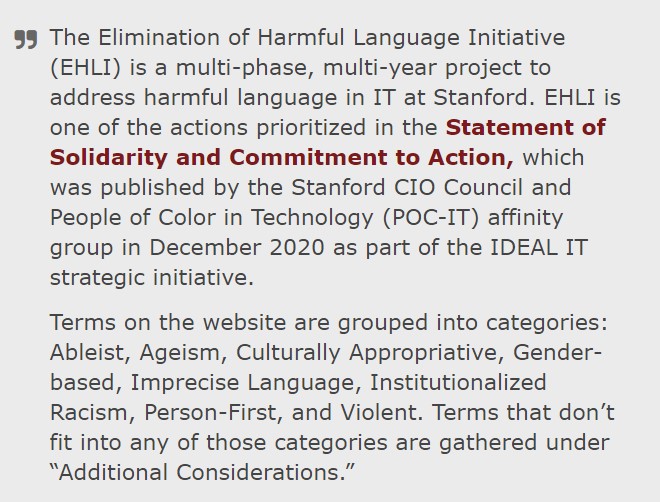
This recent article in Winepressnews (excerpt pictured above) describes how people’s perceptions are being shaped and controlled today through the misuse of words and reinterpretation of language. From the article;
“Even words like ‘American’ have also been added to the list, asserting that ‘When we talk about ‘Americans’ in the United States, we’re usually just referring to people from the United States. This erases other cultures and depicts the United States as the dominant American country.’ Instead Stanford wants students to simply say ‘US Resident.'”
In Genesis we read about the confusion of languages that God initiated (Gen. 11: 6-8) after the people, united in their intention to build a tower to the heavens, tried to make themselves equal to God “that we may make ourselves a name” (Gen 11:4 ).
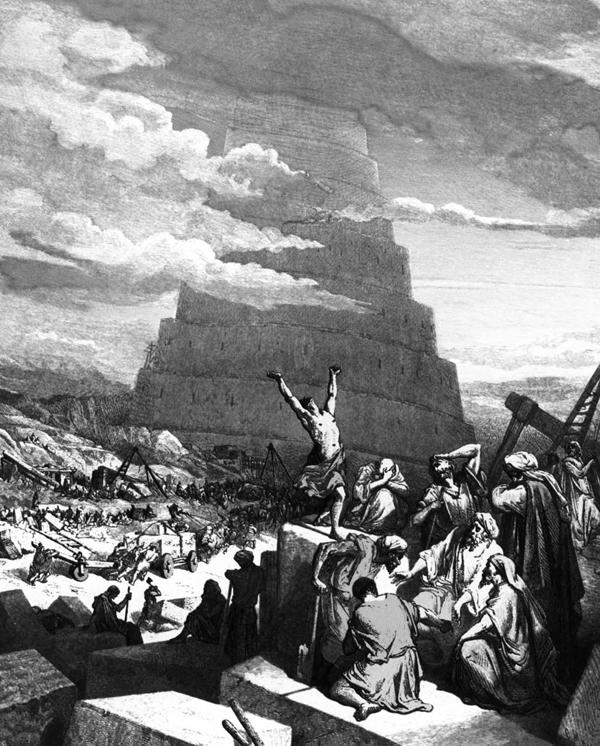
Babel
Capital of Babylon, now a ruin near Hillah in Iraq, late 14c., from Late Latin, from Hebrew Babhel (Genesis xi), from Akkadian bab-ilu “Gate of God” (from bab “gate” + ilu “god”).
The name is a translation of Sumerian Ka-dingir. The meaning “a confused medley of sounds” (1520s) is from the biblical story of the Tower of Babel and the confusion of tongues (Genesis xi). The element bab figures in other place-names across the Middle East, such as Bab-el-Mandeb, the strait at the mouth of the Red Sea.
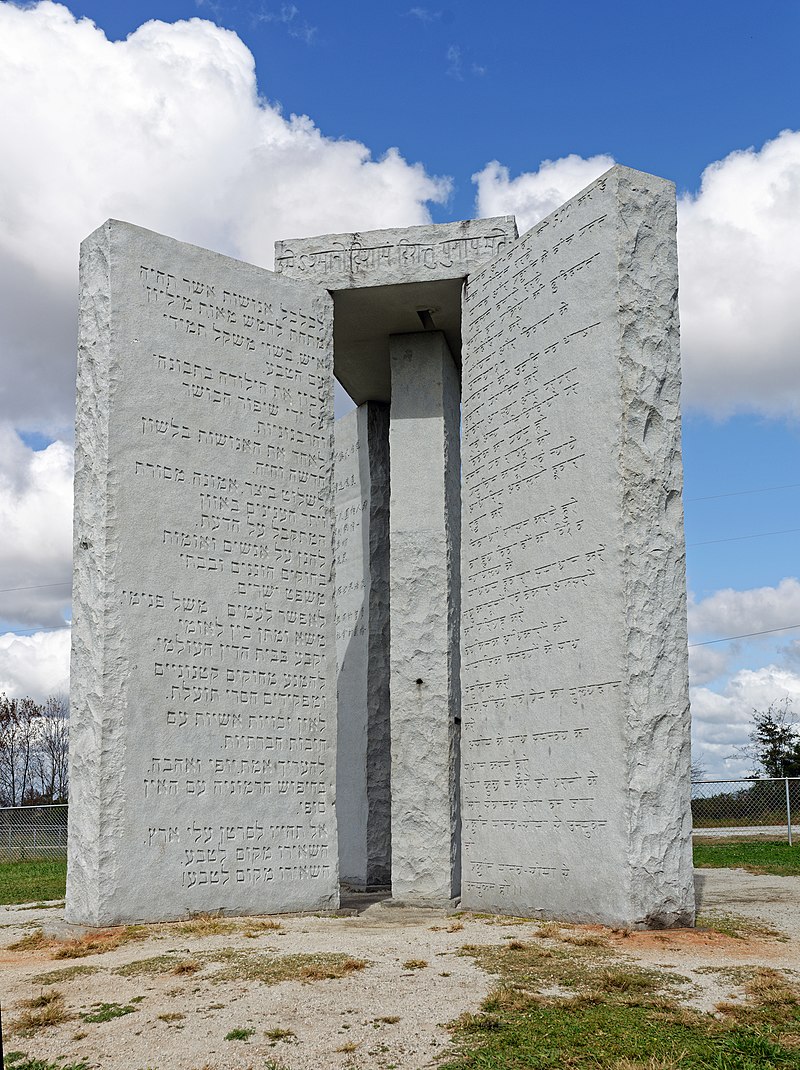
When peoples/cultures disappear or are wiped out, this inevitably affects the dialects/languages they speak as well. “Rebuilding” the Tower of Babel is an old plan of Satan, which has especially gained shape in the last two hundred years.
“The inscriptions on the Guidestones were meant for current and future generations. Sandblasted along the square capstone sitting atop the structure was the basic message: “Let these be guidestones to an age of reason,” in Babylonian cuneiform, Egyptian hieroglyphics, Sanskrit, and classical Greek. The four granite slabs, each weighing 42,137 pounds and standing more than sixteen feet in height, listed ten “guides” for mankind in eight different languages. The languages represented on the four major stones were Arabic, Chinese, English, Hebrew, Hindi, Russian, Spanish, and Swahili. The engraved messages dealt with four major areas: governance and the establishment of a world government, population and reproduction control, the environment and humankind’s relationship to nature, and spirituality.” Georgiaencyclopedia.org
It is noteworthy that Hebrew is mentioned in the Georgia Guidestones, which correlates with the political/spiritual movements initiated in the 19th century and the political events that followed. The Russian Jewish linguist Eliezer Ben-Yehuda (also)was the main driving force behind the revival of the Hebrew language.
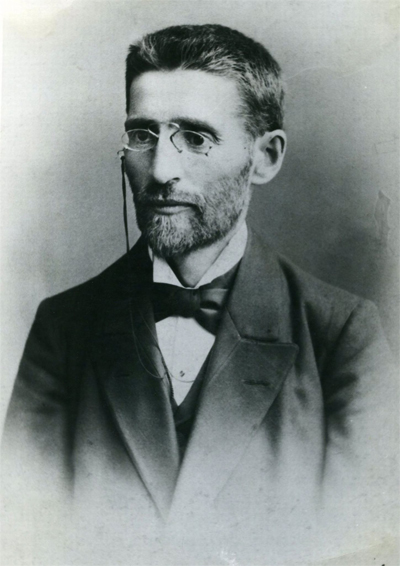
Ben-Yehuda regarded Hebrew and Zionism as symbiotic, writing,
“the Hebrew language can live only if we revive the nation and return it to the fatherland.” – source
In the ensuing 20th century, Hebrew gained more and more importance, especially with the establishment of the State of Israel.
Hebrew language | Origin, History, Alphabet, & Facts
Hebrew language, Semitic language of the Northern Central (also called Northwestern) group; it is closely related to Phoenician and Moabite, with which it is often placed by scholars in a Canaanite subgroup. – Encyclopedia Britannica
Many Christians are eagerly learning Hebrew today, especially through the Hebrew Roots Movement (HRM).

What is not known to many people, especially Christians, is that in 1982 a book entitled “Hebrew is Greek” was published in which the theory was proposed that the Hebrew and Arabic languages are derived from Greek.
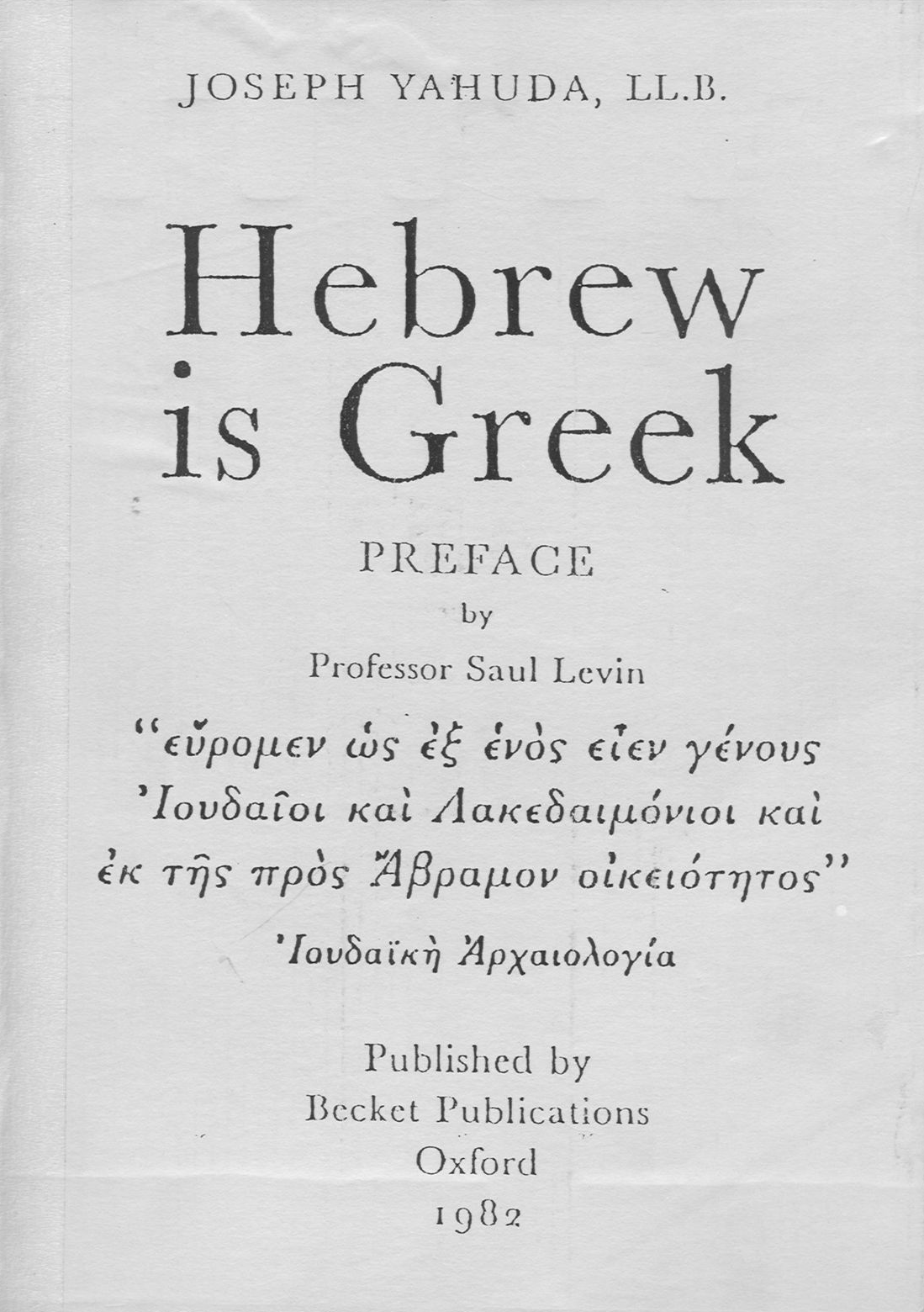
The author Joseph Ezekiel Yahuda (1900-1995), a lawyer and professor of Hebrew linguistics, and the son of Isaac Benjamin Ezekiel Yahuda, an ethnic Jew and longtime researcher and linguist, argued that virtually all Hebrew and Arabic words could be “derived” from Greek. From Bristolgreeks.com,
“The suppressed, ages-old, historical truth, was resurrected through the publication of this book by Becket Publications of Oxford, England (ISBN O 7289 0013 O). Following the book’s publication, and while only a limited number of copies circulated for a few fortunate individuals, the book disappeared from the face of the earth. It was as if an invisible hand intervened and blocked its circulation. It cannot be found at any public library, it is not sold at any bookstore on earth, not even in a curiosity or antique shop. The only information available about the book throughout the world is its title. No book reviews on this book were ever published, neither positive nor negative, moderate or offensive. Nor, it seems, has there been any other evaluation of the work. One must eventually come to the inescapable conclusion that every one of the copies originally published was somehow withdrawn through some sort of a secret operation with a global reach.” Bristolgreeks.com
RareBooksDigest writes about Yahuda,
“For about 30 years, the genius Jewish researcher Joseph Ezekiel Yahuda compared 3 languages: Jewish, Arabic and Ancient Greek Homeric. Finally, in the year 1982, in London UK, he published a 680-page book titled ’’ Hebrew is Greek’’. Suprisingly, most of the copies of this book have mysteriously disappeared. They disappeared from bookstores and most libraries, leaving only very few copies available. This scarcity gives the book the prospect to have increasing value as the years pass. It should be noted that in 2009 the book’s value was about 500 USD while today, two years later, the value of this book on the Amazon online bookstore is currently 1500 USD…..The foreword of the book is by the Professor Saul Levin, of the Ancient languages of the University of New York. In his foreword Dr Levin states that in Yahuda’s book there is overwhelming evidence which proves that Hebrew, actually Biblical Hebrew, is camouflaged Greek. He goes on to say that their difference is merely found in the pronunciation of the languages. In this book, there are many examples which prove how the Jewish words are linked with Greek words. It is also stated that the Jewish, Christian and Islamic civilizations are the three pillars of modern civilization, which all have an ancient Greek foundation in common.
Why and how did the book disappear? The answer remains an enigma. If one searches the well known libraries of the world, the book may not be found.” – RareBooksDigest

Why? Who has a specific interest in not making this book available to the public? Could it have to do with the author’s conclusions, the disclosure of which could have a significant impact on the perception of our identity and the Bible? It is striking that all the European languages, with the exception of English and Spanish, are to disappear. On the basis of the languages which, according to the GGS, should play a role in the desired order, one can also classify the geopolitical orientation (looking to the “East”). Russian will continue to be spoken: what does this tell us with regard to the current smoldering conflict? Hm…. probably no enemy there, right? But the “West” is to disappear and consequently with it the nations that are subsumed under it.
Let’s see what we can find on Yahuda and his conclusions. In the preface of his book, J. Yahuda notes:
“From the beginning, I based a lot of my work on Arabic. With my theory, it became possible for me to correct the translation of the Septuagint, using the Septuagint and the translation of the Bible, using the Bible. These discoveries cured me of my dyslexia in relationship to Greek and Hebrew and made me capable of reading a Hebrew word as if it had been a variation of the word. I formed a series of phonetic and morphology rules. I gradually gathered a number of valuable facts. Some examples are that the declension dotiki [dative] exists in Hebrew, that the masculine plural is the same in Hebrew and Greek, and that, in general, a compound Greek verb is equivalent to a Hebrew compound verb. I estimate that 9 out of each 10 words of the [Jewish] Bible can be proved to have a purely Greek equivalent. Many issues were resolved which prove that the Greeks and Jews hold some customs and religious convictions in common, whereas the Hebrew language is proven to be richer and more beautiful than believed until today because of the existence of these groups of words. This whole matter is, in practice, consistent with the following two proposals: Biblical Hebrew is Greek; and, the Jews are Asian Greeks. In reality, the conclusion of this massive, extended and complicated research can be summarized in the following brief sentence:
“Hebrew is ‘Greek wearing a mask.'” – BristolGreeks
I found a Reddit post attempting to discredit Yahuda. But judging by his credentials and family, it would appear that Yahuda knew exactly what he was talking about. I also find it interesting that you can find a Wikipedia page about him in Spanish, but not English. I just translated this in Google Translate:
Joseph Ezekiel Yahuda was a lawyer, freelance author and professor of Hebrew linguistics. Born in Jerusalem on 29 July 1900 . He was the son of Isaac Benjamin Ezekiel Yahuda, researcher and linguist. In 1982 , he published a book titled Hebrew is Greek, Greek is Hebrew , in which he proposed the theory that the Hebrew and Arabic languages are derived from Greek . He exposed that virtually all Hebrew and Arabic words could be “derived” from Greek. He died in 1995 in Westcott , Surrey , England .
The examples of the etymology proposed by him are as follows: [1] .
- Israel < Is-ra-el < εις (‘of great scope’) + ρα (‘king’) + ηλ (‘sun’)
- Cain < Ka-en < Κα ην < Γα ην < Γήινος (‘of the earth’).
Published works
- http://www.archive.org/details/Hebrew.is.Greek 👈 There’s the book if you want to look at it.
- Joseph E. Yahuda, Hebrew is Greek, Greek is Hebrew Oxford : Becket Publications , ( 1982 ) 686 pages . ISBN 0-7289-0013-0
- Joseph E. Yahuda, Law and Life According to Hebrew Thought . New Series, Vol. 26, No. 3 (January 1936), pp. 283-2
- Joseph E. Yahuda, This democracy Sir I. Pitman & Sons, Ltd. ; (1937) 146 pages.
- Joseph E. Yahuda, An Original Interpretation of Masonry. Masonic Record Ltd. (1952) 11 pages.
His other book titles suggest more possible reasons for his book “disappearing.”

Freemasons are very aware of the power of language to control civilizations, and are fascinated with linguistics.
The Language of Jesus
In the time of Christ, three languages figured prominently in the lives of the people of Judaea — the common language of Aramaic, the language of Hebrew, used in the synagogues, and the Greek language — which was commonly spoken and understood throughout the Roman Empire.
“Some Aramaic words and expressions are preserved in the Gospels, such as Talitha cum, which means, “Little girl, get up!” (Mark 5:41). Also, Abba (“Father”; Mark 14:36; Gal.4:6; Rom.8:15); Eloi, Eloi, lama sabachthani (“My God, my God, why have you forsaken me”; Mark 15:34); Cephas (“Peter”; John 1:42); Mammon (“Wealth”; Matt.6:24, RSV); Raca (“Fool”; Matt.5:22, RSV). In fact, we can be specific and say that Jesus spoke a Galilean version of “western Aramaic,” which differed from that which was spoken in Jerusalem (Matt.26:73; compare Acts 2:7).
Jesus could also read and speak Hebrew… Jesus stood up and read the Hebrew Scriptures in the synagogue of Nazareth (Luke 4:16-20), showing He could also read and speak Hebrew. Some Hebrew words are also preserved in the gospels, such as, Ephphatha (“Be opened”; Mark 7:34); Amen (“Amen”: Matt.5:26; Mark 14:30, RSV).” – NTGreek.org

Robert H. Stein writes in his book, in Jesus The Messiah: A Survey of the Life of Christ:
“The third major language spoken in Palestine was Greek. The impact of Alexander the Great’s conquests in the fourth century B.C. resulted in the Mediterranean’s being a ‘Greek sea’ in Jesus’ day. In the third century Jews in Egypt could no longer read the Scriptures in Hebrew, so they began to translated them into Greek. This famous translation became known as the Septuagint (LXX). Jesus, who was reared in ‘Galilee, of the Gentiles,’ lived only three or four miles from the thriving Greek city of Sepphoris. There may even have been times when he and his father worked in this rapidly growing metropolitan city, which served as the capital city of Herod Antipas until A.D. 26, when he moved the capital to Tiberias” – Jesus the Messiah: A Survey of the Life of Christ, Robert H. Stein, InterVarsity Press, 1996, p.87
Stein further tells us that the existence of “Hellenists” in the early Church (Acts 6:1-6) implies that from the beginning of the Church, there were Greek speaking Jewish Christians in the Church. The term “Hellenists” suggests their language was Greek, rather than their cultural or philosophical outlook. Remember, these were Jewish Christians whose primary language was Greek — they were not Greek philosophers or their followers, but followers of Christ Jesus.
Stein goes on to explain further:
“Two of Jesus’ disciples were even known by their Greek names: Andrew and Philip. In addition, there are several incidents in Jesus’ ministry when he spoke to people who knew neither Aramaic nor Hebrew. Thus unless a translator was present (though none is ever mentioned), their conversations probably took place in the Greek language. Probably Jesus spoke Greek during the following occasions: the visit to Tyre, Sidon and the Decapolis (Mark 7:31ff), the conversation with the Syro-Phoenician woman (Mark 7:24-30; compare especially 7:26) and the trial before Pontius Pilate (Mark 15:2-15; compare also Jesus’ conversation with the ‘Greeks’ in John 12:20-36)” (p.87).

The fact that Jesus Christ and the disciples all knew and spoke Greek, as a “third language,” in addition to Aramaic and Hebrew, is also indicated and supported by the fact that all the gospels and epistles of the New Testament are written and preserved in the Greek language.
STOP AND THINK!
It is very SIGNIFICANT that no early Christian documents are extant in Aramaic!
“ALL the earliest New Testament documents and fragments are in Greek!… Papias, a second-century bishop of Hierapolis in Asia Minor stated that Matthew had put together the “sayings” of Jesus in the Hebrew dialect, Aramaic. But no one has ever seen them. All we have are GREEK manuscripts, and as far back as we go, GREEK is the language of the New Testament! Strange, isn’t it, that not one manuscript in Aramaic or Hebrew predates the Greek?” – NTGreek.org
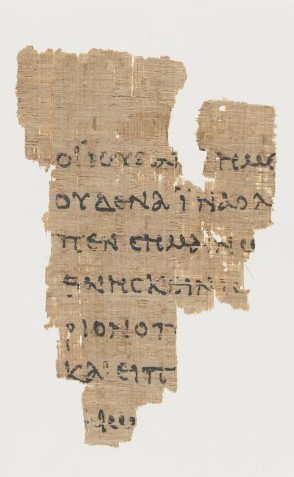
Earliest New Testament Fragments in GREEK!
“Scholars have long denied the veracity of the New Testament Scriptures, claiming that the earliest gospels were not eye-witness accounts of Christ and His life, but were written some one hundred years afterward, or about the middle of the second century, and based on hearsay, myth, fable, and oral stories which had been passed down. Thus, many scholars have regarded the very words of Christ, as recorded in the gospels, as “suspect.”
“Astonishing as it may seem, however, bits of papyrus in an Oxford University library puts the lie to the cherished theories of unbelieving, skeptical scholars! Three scraps of text of the gospel of Matthew, inscribed in Greek, have traditionally been believed to have been written in the late second century. But German papyrus expert Carsten Thiede has published a paper arguing that these fragments kept at Oxford’s Magdalen College very likely represent an actual EYE WITNESS ACCOUNT of the life of Jesus!…
“Some scholars have questioned the accuracy of the New Testament as historical, believing that the earliest texts were written long after the actual events described. However, careful new analysis by Professor Thiede has dated the fragments to the middle of the first century, thereby indicating that they are evidence that the Matthew Gospel was written only a generation after the crucifixion, or even earlier! Says William Tuohy of the Los Angeles Times, “Parts of the New Testament may have been written by men who actually knew Christ, rather than authors recounting a 2nd-Century version of an oral tradition.”….
“This new discovery by Professor Carsten Thiede, a papyrus expert, will provoke controversy among scholars, if not even dismay and consternation on the part of disbelievers and skeptics. His discovery is strong evidence that the gospel accounts regarding the life of Jesus Christ are accurate, and reliable historical documents….
“A word often used by Jesus, “hypocrite,” in describing the Pharisees and Sadducees, comes from the Greek word hypokrites, a compound word with the Greek preposition hypo for “under” and krites, meaning “judgment.” This form is wholly lacking in Semitic languages. The word hypokrites basically means, “one who answers” (i.e., one who always has an answer, or excuse), but came to mean over time not only “expounder” or “interpreter,” but “orator,” “actor,” stage actor, or one who spoke from behind a dramatic mask on stage. From this it came to mean “pretender,” “dissembler.” But this Greek word, so familiar in the denunciations of Christ, has no counterpart in Hebrew or Aramaic.” – NTGreek.org
What Difference Does It Make?
What difference does it make what language Jesus and His disciples spoke? The answer becomes clear when we consider the churches and cults today that make a great issue over the use of the “sacred names” of God. These groups will not use ANY name for God or Christ in ANY language except what they call the original “HEBREW” names for God and the Messiah.
This focus on sacred names and their proper pronunciation is a teaching of Kabbalah, not a Biblical one, let alone under the New Covenant.

Peter wrote that the word of God “liveth and abideth for ever” (I Pet.1:23). It is crucial, especially in the deceptive climate today, to know that the Word of God was and is inspired and correctly preserved to all generations. As Paul wrote to Timothy,
All Scripture is God-breathed and is useful for teaching, rebuking, correcting and training in righteousness (II Tim.3:16).
Think! If God intended all mankind to only use the Hebrew names of God and the Messiah, why did He Himself divide all mankind into many language groups at the tower of Babel? Why would this same God, who created mankind and later gave him different languages (Gen.11), require them to know and “correctly” pronounce the Hebrew name of God and Christ in order to receive salvation? In God’s sight, the important thing is not whether we pronounce the syllables and consonants of His name in some precise manner, but that we repent of our dead works and turn to Him with all our heart, mind and soul.
“Greater recognition should be given to the fact that many languages were current in Palestine during the time of Jesus. While it is generally agreed that Aramaic and Hebrew were key languages of the period, I content that Greek was widespread and that Jesus not only spoke Greek but also taught in Greek. Consequently, the Gospels may contain the very words that Jesus spoke instead of translations into Greek of Jesus’ original words in Aramaic.
“Aramaic, the sister language of Hebrew, was by necessity learned by Jews in Babylonian captivity (6th century BCE) because it was the lingua franca of the empire. Joseph Fitzmyer stated that “the use of Hebrew does not seem to have been widespread” as a spoken language after the Jews returned home. Hebrew was customarily translated orally into Aramaic by a person called the meturgeman (“translator”). These translations from Hebrew were eventually written in Aramaic and were called targumim (singular, targum). ….
“If Jesus did indeed speak Greek, then we may have “direct access to the original utterances of our Lord and not only to a translation of them.” Consequently, much more than just a few Aramaic words and expressions can be connected to the Jesus of history. Porter’s observation is therefore insightful:
“It is not possible to settle the various issues regarding the linguistic milieu of first-century Palestine, as Fitzmyer rightly notes, except to say that the archaeological, linguistic and sociological evidence seems to indicate that the region was multilingual, including at least Aramaic and Greek in widespread and frequent use . . . Therefore, the likelihood that Jesus, along with most Gentiles and Jews, was multilingual himself is strong…..
“However, since 1947 CE, many literary texts have been discovered that shed light on the dialect of Aramaic spoken by Palestinian Jews prior to and contemporaneous with Jesus. The DSS reveal that Aramaic may have been the dominant language, but the evidence reveals that it was not the only language spoken. Therefore one cannot conclusively argue that Jesus spoke only Aramaic. Palestine was multilingual in the first and second century CE[20] Hebrew was the language employed by the Essenes who settled at Qumran (adjacent to the caves where the DSS were found) in order to preserve the sacred law (i.e., the Torah) of the Jews. Hebrew by this time had become the language associated with temple rituals and worship in synagogues where the Law and Prophets (the Torah and the Nevi’im) were read. The majority of the Jews no longer understood Hebrew……
“If Aramaic was the dominant language, why was Greek the common language (koinē) of the period? If Aramaic was the dominant language, why was Greek so prevalent in the literature, the architecture, and the culture of both Galilee and Judea in the first century CE? ….Contrary to contemporary scholarship, I find that Greek was more widely used in both written and oral form by Jesus, his disciples, and the Jews who inhabited first-century Palestine. Interestingly, the evidence reveals that Greek became the dominant language spoken among Jews and Gentiles in Galilee in the first century CE.” – Bibleinterp.arizona.edu
It is also interesting that Hebrew was rediscovered in the 19th century. A language that most Jews did not even speak at the time of Jesus (It was likely only spoken by the scribes and so-called elites). Keep in mind that Pilate had the reason for Jesus’ execution affixed to the cross: in Latin, Greek and Hebrew.

Language is an immensely important part of understanding our place in the world.
“Because language discloses cultural and historical meaning, the loss of language is a loss of that link to the past. Without a link to the past, people in a culture lose a sense of place, purpose and path; one must know where one came from to know where one is going. The loss of language undermines a people’s sense of identity and belonging, which uproots the entire community in the end. Yes, they may become incorporated into the dominant language and culture that has subsumed them, but they have lost their heritage along the way.” – TheAtlantic.com
As we speak to each other, God also speaks to us. He communicates His message through language/His Word, written through the people chosen by Him for this purpose. But He is only correctly understood if He opens His Word to us by His Spirit. His Spirit unites all believers apart from the prevailing languages among cultures. Thus, we read in the Acts of the Apostles that the people heard the apostles/Peter speak in their own language as God’s Spirit gave the apostles to speak. (Acts 2: 4 ff.)
The key to communion with God, to understanding His Word, is not through using the “right” language, as some religious movements would have us believe, but Jesus, the Word Himself, who is with/in us through the Holy Spirit, and guides us into all truth.
“Heaven and earth shall pass away, but my words shall not pass away.” Mat.24:35



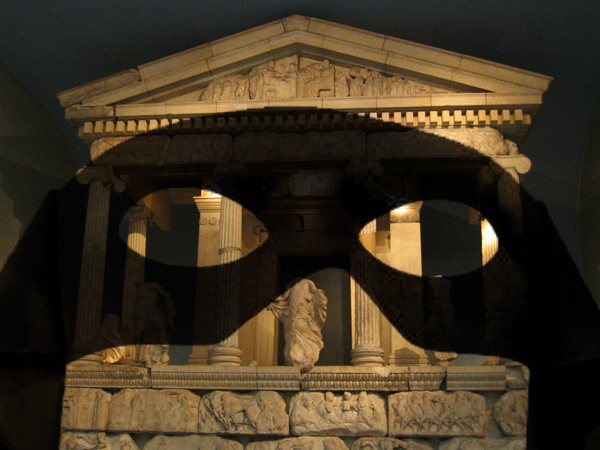




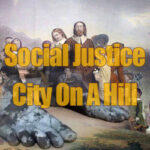
![STARS, WARS, BLOOD & LUST… [The “royal secrets” of the Djedi knights of Scientism]](https://christianobserver.net/wp-content/uploads/2023/11/star-wars-blood-lust-150x150.jpg)

